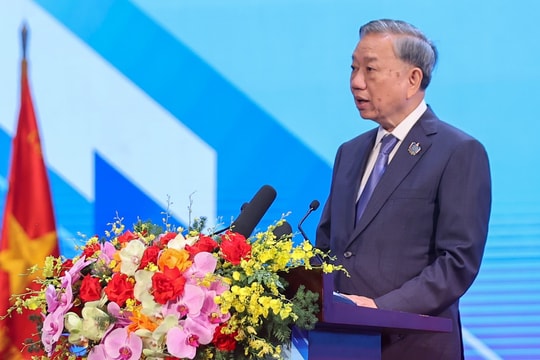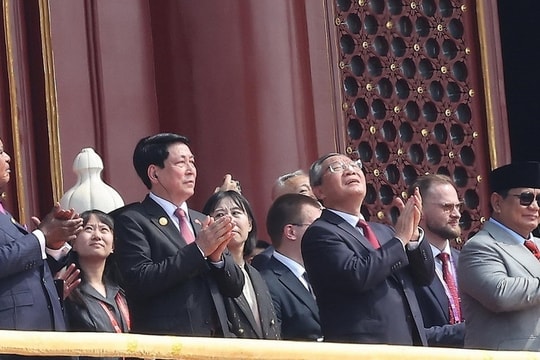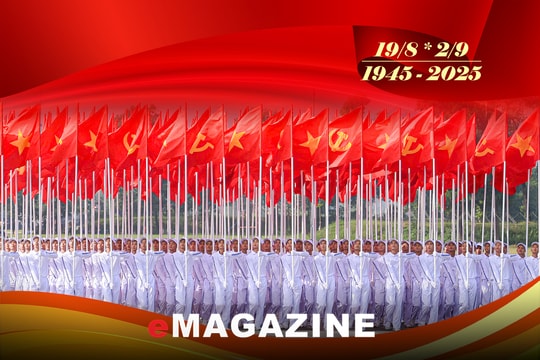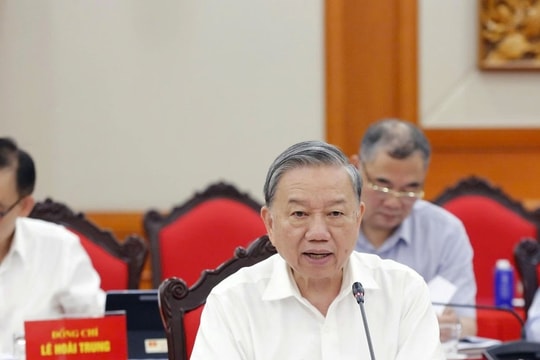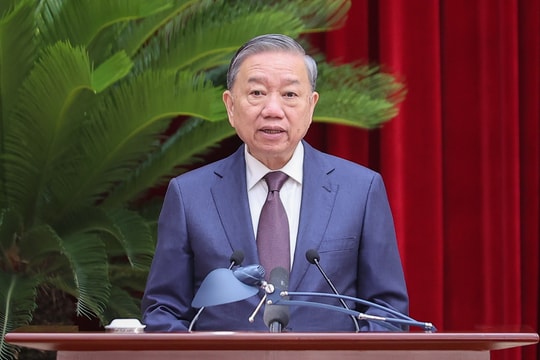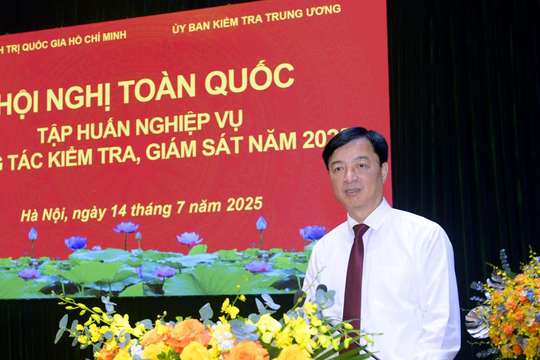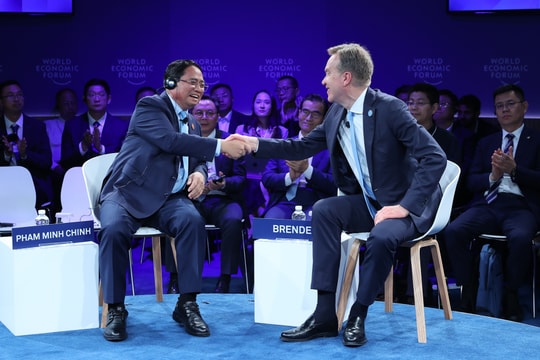Take advantage of opportunities in integration
(Baonghean) - Participating in the Trans-Pacific Partnership Agreement (TPP) and joining the ASEAN community... is a great opportunity for Nghe An enterprises to deeply integrate and expand their markets to the US, Japan, Canada, ASEAN countries... That trend requires enterprises to pay attention and grasp information to have more business opportunities.
In Nghe An province, there are not many enterprises producing consumer goods and their competitiveness is not high. Therefore, when expanding trade with countries in the region and the world, small and medium enterprises find it difficult to survive.
Mr. Thai Dai Phong, Director of Thai Dai Phong Company, said that when joining international economic organizations, the competitiveness of Nghe An enterprises is very weak, which is worrying. Because the companies are small in scale, have poor financial resources, and have a narrow market, trading is a big challenge for enterprises...”.
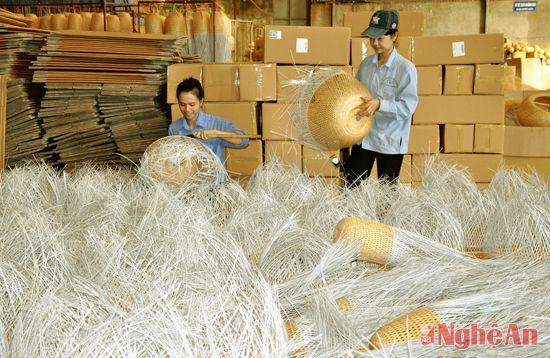 |
| Lantern lampshade production at Duc Phong Company Limited. |
Nghe An currently has more than 7,000 small and medium-sized enterprises operating, with 18 branches and over 1,000 members. Although the scale is still limited, it has made a significant contribution, creating a widespread business network, from economic centers to rural areas, both producing and serving as a channel for distributing and consuming products for society.
However, many businesses are still vague about integration. Recently, the Association of Small and Medium Enterprises has planned to implement activities to disseminate and popularize integration for businesses in Vinh City, Quynh Luu cluster, Thai Hoa cluster and Do Luong cluster. Particularly for businesses that produce goods, they will organize to disseminate knowledge about brands and trademarks of goods and services. The Association is also conducting a survey of businesses' training needs in order to group needs, design classes, invite lecturers, etc.
According to Mr. Nguyen Duy Tuan, Senior Advisor of VCCI in Nghe An, the integration issue has not received due attention from businesses. “At the macro level, Vietnam must self-adjust and change its management and legal methods to adapt to the conditions set forth, or in other words, domestic reforms in public procurement, e-commerce, intellectual property, and competition. On the business side, it is necessary to prepare well, which is competitiveness. Doing business must be professional, demonstrated in corporate governance, labor productivity management...” - Mr. Tuan said.
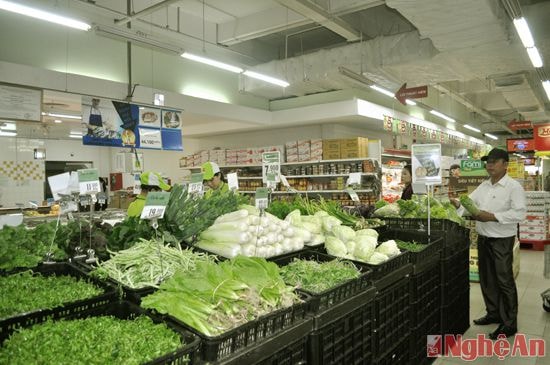 |
| Agricultural products sold at Metro Supermarket (Vinh City). |
Mr. Tran Anh Son, General Director of Nghe An Agricultural Import-Export Joint Stock Corporation, Chairman of the Association of Outstanding Enterprises, said: According to the plan, Vietnam will join the ASEAN Community (AEC) in December 2015, with the immediate goal of forming the ASEAN economy, which will bring opportunities for Vietnamese enterprises in general and Nghe An in particular to develop. However, currently, enterprises have not seen the participation of relevant levels and sectors in this issue. It is recommended that the Provincial People's Committee organize a conference to disseminate necessary contents on ASEAN community integration, TPP, so that Nghe An enterprises can know in order to take advantage of opportunities and respond to challenges.
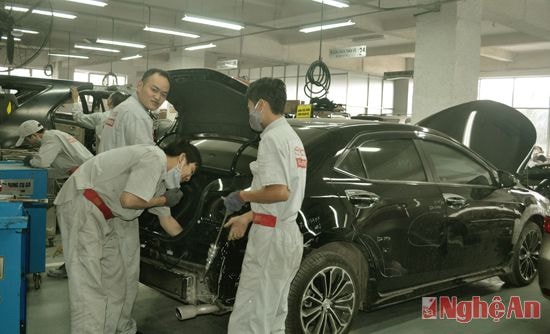 |
| Opening up to integration, the automobile industry is under a lot of pressure from both production and services. |
According to the assessment from the Department of Industry and Trade, one of Nghe An's strengths but also a vulnerable sector when integrating internationally is agricultural exports. This sector is closely linked to the income of a large part of the population in rural Nghe An. And directly to the sugar cane production, livestock, and crop production sectors... The limitations due to fragmented production, low productivity and efficiency of the province's agriculture need to be quickly overcome. Sharing this issue, Mr. Tran Anh Son said: While countries in the region have made great strides in productivity and output, our agriculture is still sluggish with innovation.
The sugar industry is an example. Currently, the price of raw sugarcane in Thailand is at 30 - 35 USD/ton (about 600 - 700 VND/kg), while the price of raw sugarcane in Vietnam is from 800,000 - 1,000,000 VND/ton (800 - 1,000 VND/kg). Therefore, Nghe An sugarcane enterprises are facing challenges at the threshold of integration.
Joining TPP and AEC, the products that are expected to benefit the most from Vietnam's participation in TPP are textiles, footwear, and electronics. Regarding imports, the import structure also focuses on the largest products, including textiles, clothing, footwear, and service imports.
Joining TPP is a very important milestone because TPP is a region that accounts for 40% of GDP, 30% of global import and export turnover, some requirements in TPP negotiations are even higher than WTO negotiations. High requirements can cause difficulties for Vietnam, especially the implementation costs of the State and the compliance costs of enterprises, but carefully consider some of the standards in it.
Ms. Vo Thi An, Deputy Director of the Department of Industry and Trade, said that if they know how to take advantage of opportunities from integration, Nghe An enterprises in particular and Vietnam in general will be able to access large markets with import tax of 0%, combined with clearer commitments on improving the investment environment and protecting intellectual property rights, which will certainly contribute to attracting foreign investment. The new wave of investment will create many jobs, form new production capacity to take advantage of export opportunities, and participate in regional and global value chains brought about by integration.
The Trans-Pacific Partnership (TPP) originated from the Trans-Pacific Partnership (P4) Agreement signed on June 3, 2005, effective from May 28, 2006 between the four countries of Singapore, Chile, New Zealand, and Brunei. To date, 12 countries have participated in the negotiations, including the four founding members, plus Australia, Peru, the United States, Malaysia, Vietnam, Canada, Mexico, and Japan. On the evening of October 5 (Vietnam time), the trade ministers of 12 countries participating in the Trans-Pacific Partnership (TPP) negotiations in Atlanta (USA) reached an agreement. Present at the press conference in Atlanta, Vietnamese Minister of Industry and Trade Vu Huy Hoang affirmed that although Vietnam is one of the least developed economies in the TPP, it is still committed to fully implementing all of its obligations and rights in the TPP. |
Thu Huyen

